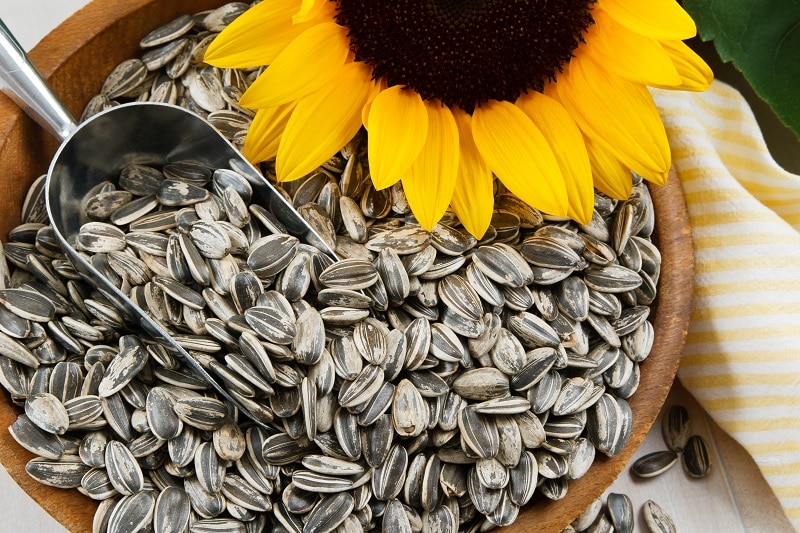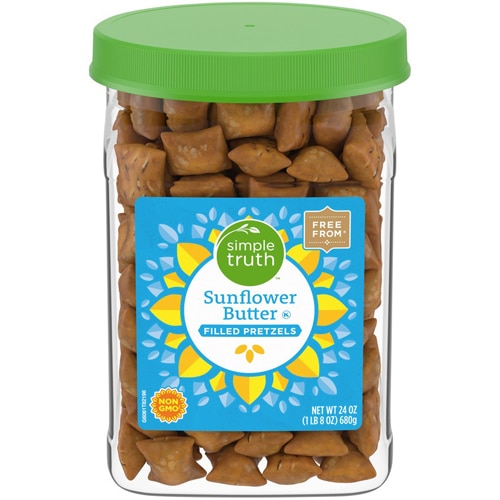If there’s any flower that symbolizes sunny, warm weather, it’s the sunflower. Sunflowers are known for their tall stems and big, beautiful yellow petals. A lesser known fun fact is that the sunflower is not a single flower, but 1,000-2,000 smaller flowers connected by a common base! Sunflowers also produce delicious seeds, which have become the snack of choice for road trips and at baseball games everywhere. Oh, and they're really,
really good for you.

Sunflower seeds are harvested at the end of the season from the middle of the sunflower head. You know it’s time to harvest sunflower seeds when:
- the back of the sunflower head turns lemon yellow
- the flower head faces downward
- and the florets in the brown center of the flower disk are shriveled.
You can cut off the sunflower head and place it in a paper bag to dry. Once dried, rub your hand over the seeds or use a fork to loosen them.
Kansas State University suggests soaking the seeds in salt water and then roasting them to enjoy.
Not only are sunflower seeds tasty – they’re nutritious too! Let’s dive into the nutritional benefits of sunflower seeds, and how you can incorporate them into your meals just in time for warmer weather.
The benefits of sunflower seeds
Sunflower seeds are a nutritious snack or addition to any meal. A serving of sunflower seeds is ½ oz. of seeds, or about half the size of your thumb. If you’re enjoying
sunflower butter (like peanut butter, but made of sunflower seeds), the serving size is 1 tablespoon.
Sunflower seeds provide the following nutrients:
1. Protein
Sunflower seeds fall into the protein food group. The USDA recommends consuming about 5.5 oz. equivalents of protein a day. To put things into perspective, about 2 oz. of sunflower seeds can fit into the palm of a slightly cupped hand.
While many Americans meet the protein recommendations for meat, poultry and eggs, we don’t tend to meet the recommendations for seafood, nuts, seeds and soy products. Meeting the recommendations for these
protein sources can help increase intake of important nutrients like fiber and unsaturated fats. Sunflower seeds also serve as a
plant-based protein that can fit into a vegetarian or vegan eating pattern.
2. Fiber
One-fourth cup, or about 2 oz., of hulled (seeds removed) sunflower seeds provides 3 grams of fiber. Fiber is important because it may help reduce blood cholesterol and reduce the risk of heart disease. Fiber is also important for proper bowel function.
Men and women ages 19-50 need about 38 grams and 25 grams of fiber a day, respectively. Adults age 51+ need less fiber: 30 g a day for men and 21 g a day for women. Sunflower seeds are one way to help you reach your daily fiber goals.
3. Mono and polyunsaturated fats
Most of the fat in sunflower seeds is mono and polyunsaturated fat, rather than saturated fat. Saturated fat can increase LDL cholesterol, which may in turn increase your risk for heart disease. The USDA recommends replacing saturated fat with mono and polyunsaturated fats whenever possible to potentially reduce the risk for heart disease.
Next time you’re making a salad, try reducing or replacing options higher in saturated fat, such as bacon or cheese, and substituting sunflower seeds.
It’s recommended that adults consume between 310-400 mg of
magnesium a day. A fourth cup (2 oz) of hulled sunflower seeds can provide about 113 mg
3, or 28-36% of your daily magnesium needs. Magnesium helps more than 300 processes in the body including:
- Synthesizing proteins
- Nerve function
- Bone development
- Blood glucose control
- Blood pressure regulation
Magnesium also helps muscles contract and the heartbeat normally.
Some individuals have lower consumption of, or decreased absorption of, magnesium, including older adults, people with gastrointestinal diseases, or people with type 2 diabetes. If you are affected by any of these, consider incorporating sunflower seeds into your food routine to increase magnesium intake.
5. Potassium
A quarter cup (2 oz.) of hulled sunflower seeds provides between 6-8 percent of an adult’s daily potassium needs. A true busy bee, potassium is in every cell in our body! Potassium is important for keeping our cells functioning normally and for regulating blood pressure. In fact, potassium can help ease tension in your blood vessels, which can help lower your blood pressure. Toss
sunflower seeds in a trail mix with potassium-rich
dried apricots and raisins for a potassium punch!
Ways to enjoy sunflower seeds
Ready to enjoy sunflower seeds? Before you do, note that sunflower seeds are often coated in salt. Check the nutrition facts panel on your sunflower seeds for their sodium content. Opt for no-salt-added sunflower seeds, like these
seeds from Woodstock Organic or
Bob’s Red Mill. If you do choose sunflower seeds with salt or seasoning added, aim for low sodium options with 140 mg or less of sodium per serving.
If you are looking for ways to incorporate sunflower seeds into your week, here are our favorite ways to add sunflower power to your dishes.
Sunflower seeds are a nutritious plant-based protein source that can provide fiber, mono and polyunsaturated fats, and important nutrients like magnesium and potassium. You can enjoy the versatile sunflower seed in a variety of ways as part of a healthful eating pattern.
For more recipes featuring sunflower seeds, like this 4-Ingredient Vanilla Sunflower Seed Butter (yum!), click here.




